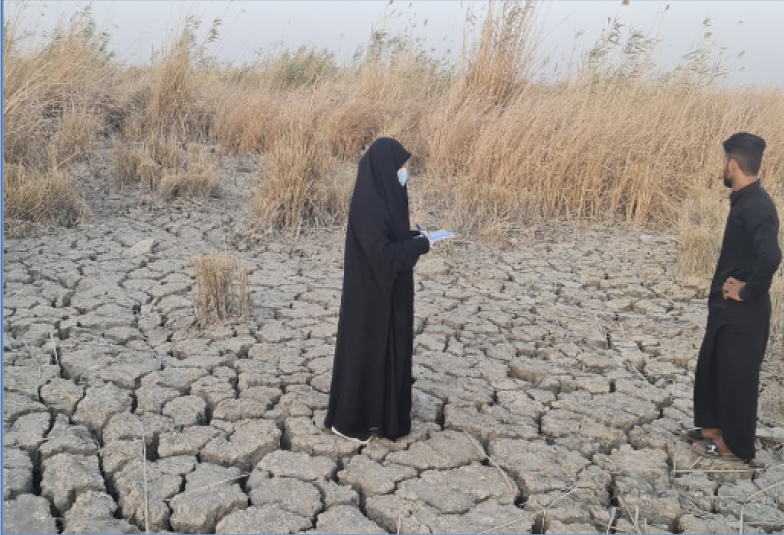Iraq: Climate change, like war, displaces entire communities
A phenomenon that was previously evident in the north and is now also being felt in the south, in the area where the Tigris and Euphrates converge. According to the UN, it is the fifth country in the world for vulnerability to climate change, more than 130,000 people have lost land and homes. In 2023, 25 per cent of small farmers in the Nineveh Plain had to give up their crops.
Baghdad (AsiaNews) - Climate change, after years of war and sectarian violence, as the cause of a progressive displacement of part of the population. This also happens in Iraq as emerges from a study by the Norwegian Refugee Council (NRC), according to which the effects of global warming and changes to the environmental ecosystem have pushed entire communities to leave their land.
The phenomenon is evident in the north, in the Nineveh plain, already the scene in the summer of 2014 of the flight of hundreds of thousands of people due to the rise of the Islamic State, then defeated three years later (at least on a military level). However, for some time there have been cases of exodus also in the south, in particular in the area where the Tigris and Euphrates rivers meet.
The environmental theme is topical in recent weeks, especially in the Middle Eastern region where COP28, the UN climate conference in Dubai (UAE), is underway until tomorrow, an element that has now become a mission ground and meeting point with other faiths, starting from 'Islam.
Less than 24 hours from the conclusion, the UN climate chief Simon Stiell urged the participating nations to mediate to reach a final agreement, which is still far away despite some progress in the negotiations. The high official warns that "every step backwards" on the goals set on the eve "will cost several million human lives" and it is up to the presidency (the United Arab Emirates) to mediate for a shared draft which should then become "the final agreement" as desired.
There are two key issues: scope and ambition of the climate change objectives, financing and support to be allocated to achieve the goal.
Returning to the 16-page NRC study, it is titled “Inadequacy and Inequality: Water Scarcity and Displacement in Iraq.” Inside, the impact of natural events, starting from drought, on entire communities forced to leave homes and lands, in the north and west, is illustrated in detail.
The United Nations has classified Iraq as the fifth most vulnerable country in the world to the effects of climate change and the decrease in water levels, combined with the increase in temperatures, are two of the most immediate impacts of this trend which seems unstoppable.
“The Iraqi climate - underlines the NRC report published on December 3 - is changing faster than people can adapt to it”.
Furthermore, the percentage of interviewees [out of 1079 people consulted] who say they are displaced due to drought has also grown, with the figure rising "from 2 to 5% on a national scale" with the Nineveh Plain among the critical areas.
“All my neighbors have left,” said Abu Rashid, a resident of the province and one of those interviewed, who adds that he has become a “day worker” employed by an agricultural entrepreneur who owns a farm.
However, even the south, where the country's two main rivers, the Tigris and the Euphrates, converge, is subject to progressive displacement due to the climate. According to the International Organization for Migration (IOM), cited by NRC, 130 thousand Iraqis have lost their homes and lands due to climate change.
The UN body also assessed other areas that had never been examined previously, again in the south, attributing part of the increases compared to a previous figure of 80,000 to this factor.
According to the report, two thirds of the displacements in the south took place in urban centres, while even today 1.2 million inhabitants are displaced due to wars and sectarian violence, the vast majority finding refuge in Kurdistan.
The climate emergency, therefore, adds to other ongoing emergencies, contributing to further aggravating an already precarious situation.
Finally, the report finds that 60% of farmers surveyed in Anbar, Kirkuk, Nineveh and Salahuddin were forced to cultivate less land or use less water during the 2023 farming season, and four in five had to reduce food spending. 80% of those interviewed in Nineveh and Kirkuk have had to reduce food spending, i.e. the amount dedicated to personal consumption, in the last 12 months.
25% of small-scale farmers in Sinjar and Ba'aj, in Nineveh, have had to give up farming this year. Part of the difficulties faced by the Iraqi agricultural industry, the study concludes, are due to low water levels.
(Photo taken from the United Nations website)







.png)










